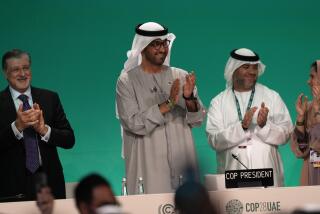Climate deal gives room to all at the table
The landmark global warming document agreed to on Saturday at a United Nations climate conference here was weakened in furious last-minute negotiations, but still made important progress in two key areas.
Under pressure from the United States, the document abandoned setting any firm goal for worldwide emissions reductions and left open the possibility that industrialized countries could avoid individual caps on their emissions.
Nonetheless, for the first time, it enrolled the developing world in efforts to reduce global emissions and pushed those nations to consider ways to limit their output of greenhouse gases.
More important, the agreement kept the United States -- long considered the biggest roadblock to unified action in curbing global warming -- at the negotiating table and offered hints that the country might finally be willing to join international efforts.
“At long last, the warnings from the world’s leading scientists are no longer being totally ignored by the Bush administration,” said Rep. Edward J. Markey (D-Mass.), chairman of the House Select Committee for Energy Independence and Global Warming. “When every other world leader is calling for action, not even this administration can refuse to listen.”
The unanimous approval of the document by thousands of delegates meeting on the Indonesian island of Bali now sets the “road map” for two years of negotiations to create a formal climate treaty to succeed the 1997 Kyoto Protocol, which expires in 2012. The next phase of talks is scheduled to begin in April and, ideally, conclude in Copenhagen in late 2009.
The document was almost not completed.
A primary sticking point during the last week was the inclusion of tough emissions targets recommended by the U.N.’s Intergovernmental Panel on Climate Change, or IPCC, in a series of reports issued this year, and pushed hard by the European Union.
Working through the night Friday, negotiators reached a compromise that seemed to pave the way for acceptance of the document. The targets -- which include a 25% to 40% reduction in emissions by industrialized countries by 2020 and a 50% reduction in overall emissions worldwide by 2050 -- were eliminated from the text and replaced with a footnote referring to a broader range of options in the IPCC reports.
Some delegates called the compromise weak, but it was, at least, strong enough to win the Europeans’ support. The United States also seemed pleased.
But even the watered-down document ran into trouble when it reached the assembly floor Saturday for ratification, with India objecting that the draft did not require industrialized nations to help developing countries control their emissions with technology and funding.
As had occurred so often during the week, the blame for this deficiency was laid at America’s doorstep.
The Indian position reflected one of the central themes of developing nations at the meeting: that the United States and other wealthy countries had caused global warming with their profligate use of energy and now expected less-developed countries to curb their own industrialization to prevent the problem from getting worse.
The assembly was suspended temporarily while delegates worked out alternative language to reflect the developing nations’ concerns -- language that was strongly supported by the EU.
U.N. Secretary-General Ban Ki-moon, who returned for the extended session, told the delegates he was “disappointed” in the delay and called on them to reach a compromise.
Tensions ran high. At one point, the U.N.’s top climate official, Yvo de Boer, was attacked by China for a procedural error, and left the room fighting back tears.
U.S. delegate Paula Dobriansky said that the United States could not accept the compromise language and argued that developing countries were not offering enough to curb their emissions.
The room erupted in a chorus of boos.
Marthinus van Schalkwyk, South Africa’s minister of environmental affairs and tourism, called the U.S. comments “most undeserved and without any basis,” given the developing world’s concessions during the talks. He added: “We would have liked to see a much stronger commitment from the United States.”
Kevin Conrad, a delegate from Papua New Guinea, drew applause when he told the U.S. delegation: “If you cannot lead, leave it to the rest of us. Get out of the way.”
In a stunning and unexpected reversal, Dobriansky backed down moments later.
“The United States is very committed to this effort and just wants to really ensure that we all will act together,” she told the gathering. “And with that, Mr. Chairman, let me say to you, we will go forward and join consensus today.”
She said later that the outrage in the developing world convinced the U.S. delegation that those countries were ready to accept the challenge of restricting emissions growth.
But the U.S. delegation’s acceptance of the agreement is no guarantee of eventual approval. U.S. negotiators played a key role in writing the Kyoto Protocol, which called on industrialized countries to reduce their emissions to 5% below 1990 levels. But President Clinton refused to submit the agreement to the Republican-controlled Senate for ratification when it became obvious it would be rejected.
Experts hope the climate on negotiations will change when a new administration is installed in January 2009. “This administration isn’t going to be in office when the U.S. has to agree to any targets,” said Alden Meyer of the Union of Concerned Scientists.
Getting the developing countries on board was also difficult. Countries such as China, whose total emissions may already exceed those of the U.S., and India, the world’s fourth largest polluter, have long argued that wealthy countries created the problem but expect poor countries to bear the brunt of cutbacks. Securing their cooperation “is groundbreaking,” said Don Melnick, co-director of the Center for Environment, Economy and Society at Columbia University.
Getting both the U.S. and the developing countries onboard the negotiations “is the defining moment for me and my mandate as secretary-general,” said Secretary-General Ban. “All the 188 countries have recognized that this is the defining agenda for all humanity, for all planet Earth.”
Delegates made some other breakthroughs. The group agreed to augment a U.N. Adaptation Fund that assists poorer nations in efforts to adapt to climate change. The fund currently has about $36 million, but new donations could rise to as much as $5 billion per year by 2030.
For the first time, the new agreement also recognized the importance of preserving forests in controlling greenhouse gas emissions.
The Kyoto agreement allowed countries that planted trees to claim carbon credits, but it did nothing for those who preserved existing forests. The new agreement opened the possibility of offering such credits to those countries as well.
thomas.maugh@latimes.com
--
Zarembo reported from Nusa Dua and Maugh from Los Angeles.
(BEGIN TEXT OF INFOBOX)
Key points of Bali agreement
Greenhouse gas emissions: It recognizes that “deep cuts” in global emissions will be required to prevent dangerous human interference in the climate. It makes reference to scientific reports that suggest a range of cuts between 25% to 40% by 2020, but prescribes no targets.
Deadline: Negotiations for the next climate accord should last two years and conclude in 2009 in order to allow enough time to implement it at the end of 2012. Four major climate meetings will take place next year.
Rich and poor: Negotiators should consider binding reductions of gas emissions by industrialized countries, while developing countries should consider moves to control the growth of their emissions. Wealthier countries should work to transfer climate-friendly technology to poorer nations.
Adjusting to climate change: Negotiators should support urgent steps to help developing countries adapt to inevitable effects of global warming, such as building sea walls to guard against rising oceans.
Deforestation: Negotiators should consider “positive incentives” for reducing deforestation in developing countries, many of which are seeking international compensation for preserving their forests that absorb carbon dioxide.
Source: Associated Press
More to Read
Start your day right
Sign up for Essential California for news, features and recommendations from the L.A. Times and beyond in your inbox six days a week.
You may occasionally receive promotional content from the Los Angeles Times.






